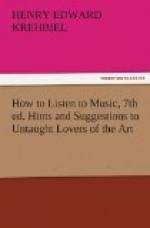Next, somebody (Archilocus) sought to heighten the effect of the story or the dialogue by consorting it with instrumental music; and thus we find the germ of what musicians—not newspaper writers—call melodrama, in the very early stages of the drama’s development. Gradually these simple rustic entertainments were taken in hand by the poets who drew on the legendary stores of the people for subjects, branching out from the doings of gods to the doings of god-like men, the popular heroes, and developed out of them the masterpieces of dramatic poetry which are still studied with amazement, admiration, and love.
[Sidenote: Factors in ancient tragedy.]
The dramatic factors which have been mustered in this outline are these:
1. The choric dance and song with a religious purpose.
2. Recitation and dialogue.
3. Characterization by means of imitative gestures—pantomime, that is—and dress.
4. Instrumental music to accompany the song and also the action.
[Sidenote: Operatic elements.]
[Sidenote: Words and music united.]
All these have been retained in the modern opera, which may be said to differ chiefly from its ancient model in the more important and more independent part which music plays in it. It will appear later in our study that the importance and independence achieved by one of the elements consorted in a work by nature composite, led the way to a revolution having for its object a restoration of something like the ancient drama. In this ancient drama and its precursor, the dithyrambic song and dance, is found a union of words and music which scientific investigation proves to be not only entirely natural but inevitable. In a general way most people are in the habit of speaking of music as the language of the emotions. The elements which enter into vocal music (of necessity the earliest form of music) are unvolitional products which we must conceive as co-existent with the beginnings of human life. Do they then antedate articulate speech? Did man sing before he spoke? I shall not quarrel with anybody who chooses so to put it.
[Sidenote: Physiology of singing.]
Think a moment about the mechanism of vocal music. Something occurs to stir up your emotional nature—a great joy, a great sorrow, a great fear; instantly, involuntarily, in spite of your efforts to prevent it, maybe, muscular actions set in which proclaim the emotion which fills you. The muscles and organs of the chest, throat, and mouth contract or relax in obedience to the emotion. You utter a cry, and according to the state of feeling which you are in, that cry has pitch, quality (timbre the singing teachers call it), and dynamic intensity. You attempt to speak, and no matter what the words you utter, the emotional drama playing on the stage of your heart is divulged.
[Sidenote: Herbert Spencer’s laws.]




